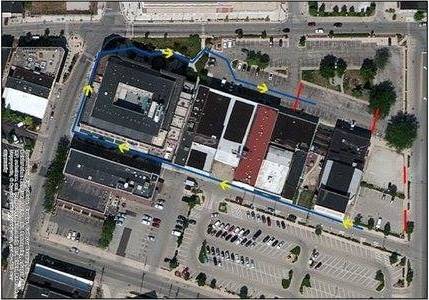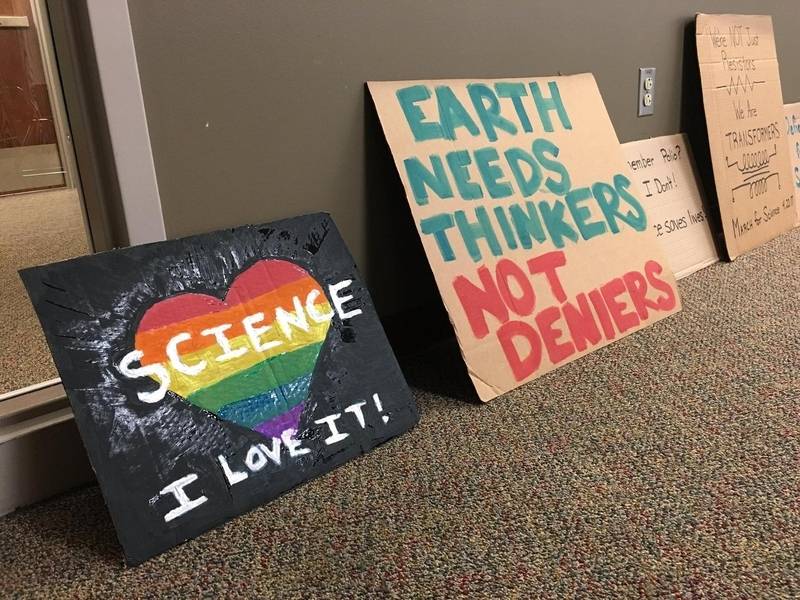This Saturday is a busy one for Champaign-Urbana. We have the Illinois Marathon, Ebertfest, and our local March for Science. “We started planning before the national march released the date and we were saying, ‘Please not April 22! Please not April 22!’,” remembered lead organizer Elizabeth Sotiropoulos. “We decided to have our [local march] in the evening. That way people who run the marathon can go home and take a nap before joining us, and we avoid any traffic.”
March for Science: Champaign-Urbana will take place at the Orpheum Children’s Science Museum on Saturday, April 22 at 5 pm. The march will be led by children from the Orpheum through downtown and back before local scientific-minded speakers share their thoughts in The Orpheum Theatre.

We want to feature K-12 students because one of the main goals of our march is education. We want our youngest kids to not only have an appreciation for science, to believe they can do science and they have a place in science, but also to have a voice for themselves. So when they see something that is wrong they have the courage stand up and say, ‘This is wrong.’”-Elizabeth Sotiropoulos, lead organizer
The Trump administration’s budget proposal and attitudes toward science are leading many scientists and fans of scientific progress to see the need for resistance. In addition to the March for Science in Washington, D.C., there are 514 satellite marches around the world. “[The march] is political, but not partisan,” said Sotiropoulos. Acknowledging anti-science sentiment and policies from across the political spectrum, she encouraged scientists to use this moment to advocate for their work. “They are experts and we need them to stand up and speak out.”
There will be seven speakers at March for Science: Champaign-Urbana, beginning with National Medal of Science recipient and UIUC Entomology Department Head May Berenbaum and followed by local high school student Saba Manetti-Tesfaye, who will start the march. The remaining five speakers will share their concerns and hopes at the rally after the march. “Our speakers will be talking about how science intersects with social justice issues,” said Sotiropoulos. “For example, Julie Pryde, a local public health administrator with the CU Public Health District, will be talking about the lack of funding for HIV research in the 1980s, and how funding cuts are repeating history for marginalized groups in the country.”
Sotiropoulos, founder of Illini Tutoring in Champaign, said she felt inspired by the local Women’s March and took up local planning for this march shortly thereafter. “We have tried hard to learn lessons from the Women’s March,” she said, referring to criticisms of lack of intersectionality in planning and message from the organization. “We have planners from diverse backgrounds, because it would be hypocritical to invite people of all backgrounds without the event being put on by a diverse group of people. Our march and rally are fully accessible. One of our planners who has accessibility needs himself has taken charge of making sure that there are [accessible paths] and an ASL interpreter. We encourage all who come to please allow people with accessibility needs to get to the area we have up front if they choose to use it so that all people in our community can participate.”
Local organizers are expecting a crowd similar in size to the local Women’s March. The Women’s March had 500 RSVPs, but close to 6,000 in attendance. As of now, the public Facebook group for March for Science: Champaign-Urbana has nearly 2,800 members and 430 people marked as ‘Going’ to the march, with more than 1,000 ‘Interested’.
The organizers want to make clear that this march is for everyone, not just professional scientists. “We are inviting people who don’t feel like they have a connection to science, because we are all scientists and discoverers in our own way. We invite students, parents, children, activists, people who have never done anything activist in their lives. We want to see everybody because science impacts everyone.” Sotiropoulos also put out an invitation to Congressman Rodney Davis to come and see the enthusiasm for science funding and discovery in his own district. “We know Flat Rodney will be in attendance, but hope that THE Rodney will join us, too.”

Marchers are encouraged to make signs and posters about why they love science or a particular issue that is important to them. “We want kids’ signs to say it in their own words. Kids can also dress up as their favorite scientist or in blue and green.” Poster ideas abound on the March for Science Facebook page, including children’s book author Andrea Beatty’s posters available for purchase at The March for Science Shop.
Sotiropoulos started planning this local march in January, and now has a full team of organizers with her. Local organizations and businesses that have partnered with them include Graduate Employees’ Organization at UIUC, Center for Advanced Study, Countryside School, Campus Middle School for Girls, Urbana School District, Women in Astronomy @ UIUC, Champaign-Urbana Moms Demand Action for Gunsense in America, Champaign County Audubon Society, and Prairie Rivers Network.
To find out more details, volunteer for the march, or make a donation, you can visit http://www.marchforsciencecu.com/.








